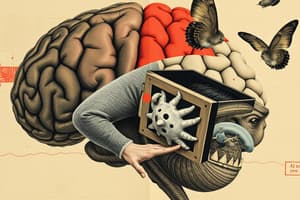Podcast
Questions and Answers
What is the primary function of dendrites in a neuron?
What is the primary function of dendrites in a neuron?
- To conduct impulses toward muscles
- To transport proteins to other locations
- To insulate the axon
- To receive excitation through synaptic receptors (correct)
Which component of the neuron is responsible for conveying impulses to other neurons or muscles?
Which component of the neuron is responsible for conveying impulses to other neurons or muscles?
- Myelin sheath
- Axon (correct)
- Soma
- Dendrite
What structure covers many vertebrate axons and speeds up neural conduction?
What structure covers many vertebrate axons and speeds up neural conduction?
- Synaptic receptors
- Dendritic spines
- Soma
- Myelin sheath (correct)
What is the role of synapses in the nervous system?
What is the role of synapses in the nervous system?
Which of the following statements about sensory neurons is true?
Which of the following statements about sensory neurons is true?
What structure serves as the control center of the neuron, containing important organelles?
What structure serves as the control center of the neuron, containing important organelles?
What are dendritic spines primarily used for in neurons?
What are dendritic spines primarily used for in neurons?
How does the structure of a motor neuron differ from that of a sensory neuron?
How does the structure of a motor neuron differ from that of a sensory neuron?
What is the primary function of presynaptic terminals?
What is the primary function of presynaptic terminals?
Which type of neuron carries information away from a structure?
Which type of neuron carries information away from a structure?
What role do radial glia play during embryonic development?
What role do radial glia play during embryonic development?
What structure is formed when a neuron's dendrites and axon are contained within a single entity?
What structure is formed when a neuron's dendrites and axon are contained within a single entity?
Which type of glia are star-shaped and wrap around the synapses of related axons?
Which type of glia are star-shaped and wrap around the synapses of related axons?
Who is regarded as a pioneer of modern neuroscience?
Who is regarded as a pioneer of modern neuroscience?
What term describes the pathway that involves the synaptic interaction between an afferent neuron and an efferent neuron?
What term describes the pathway that involves the synaptic interaction between an afferent neuron and an efferent neuron?
What does the term 'glia' derive from, and what does it reflect about their early conceptualization?
What does the term 'glia' derive from, and what does it reflect about their early conceptualization?
What primarily drives sodium ions into the cell during an action potential?
What primarily drives sodium ions into the cell during an action potential?
What happens to sodium channels at the peak of the action potential?
What happens to sodium channels at the peak of the action potential?
What effect does the opening of potassium channels have during an action potential?
What effect does the opening of potassium channels have during an action potential?
How does the amplitude of an action potential relate to the intensity of the stimulus?
How does the amplitude of an action potential relate to the intensity of the stimulus?
What role do voltage-gated channels play in action potentials?
What role do voltage-gated channels play in action potentials?
What occurs immediately after the sodium channels close during an action potential?
What occurs immediately after the sodium channels close during an action potential?
What is the primary type of cell that differentiates into neurons during development?
What is the primary type of cell that differentiates into neurons during development?
What triggers the initial opening of sodium and potassium channels in the axon membrane?
What triggers the initial opening of sodium and potassium channels in the axon membrane?
Which hypothesis suggests that the interaction between axons and astrocytes modifies synaptic activity?
Which hypothesis suggests that the interaction between axons and astrocytes modifies synaptic activity?
What type of cells build myelin sheaths in the central nervous system?
What type of cells build myelin sheaths in the central nervous system?
During hyperpolarization, what is the state of the membrane potential compared to its resting level?
During hyperpolarization, what is the state of the membrane potential compared to its resting level?
What do oligodendrocytes provide to axons for proper functioning?
What do oligodendrocytes provide to axons for proper functioning?
What is one major function of the blood-brain barrier?
What is one major function of the blood-brain barrier?
Which virus is mentioned as being able to evade the blood-brain barrier?
Which virus is mentioned as being able to evade the blood-brain barrier?
What substance do vertebrate neurons primarily depend on for nourishment?
What substance do vertebrate neurons primarily depend on for nourishment?
What happens to cells outside the brain in terms of their connectivity, compared to cells in the brain?
What happens to cells outside the brain in terms of their connectivity, compared to cells in the brain?
What does the sodium-potassium pump primarily do?
What does the sodium-potassium pump primarily do?
What change in membrane potential does hyperpolarization refer to?
What change in membrane potential does hyperpolarization refer to?
What occurs when a depolarizing current is applied to a neuron?
What occurs when a depolarizing current is applied to a neuron?
What is the significance of reaching the threshold of excitation?
What is the significance of reaching the threshold of excitation?
What is the typical resting membrane potential of a neuron?
What is the typical resting membrane potential of a neuron?
What happens to the membrane potential during action potential generation?
What happens to the membrane potential during action potential generation?
What role does the electrical chemical gradient play in a resting neuron's membrane potential?
What role does the electrical chemical gradient play in a resting neuron's membrane potential?
What occurs when a stimulation is applied beyond the action potential threshold?
What occurs when a stimulation is applied beyond the action potential threshold?
Flashcards are hidden until you start studying
Study Notes
Endoplasmic Reticulum
- A network of thin tubes involved in the transport of newly synthesized proteins to various locations within the cell.
Structure of Neuron
- Neurons consist of a soma (cell body), dendrites, axons, and presynaptic terminals.
- Motor neurons receive excitation through dendrites and transmit impulses along their axons to muscles.
- Sensory neurons are specialized to respond to specific stimuli like light, sound, or touch.
- The axon is a thin, constant-diameter fiber that conveys impulses toward other neurons, organs, or muscles, with lengths exceeding one meter in some cases.
Dendrites and Synapse
- Dendrites branch out and narrow at their ends, lined with synaptic receptors for communication.
- Dendritic spines increase surface area for synapses.
- The soma contains nucleus, ribosomes, and mitochondria, performing most metabolic work.
Myelin Sheath and Nodes of Ranvier
- Many vertebrate axons are insulated by a myelin sheath, which aids in efficient impulse conduction.
- There are interruptions in the sheath known as nodes of Ranvier.
Reflexes and Neuron Classification
- Reflexes are automatic responses to stimuli involving a reflex arc.
- Afferent axons carry sensory information into a structure, while efferent axons transmit information away.
- Interneurons have their dendrites and axon entirely within a single structure.
Glia
- Glia, or neuroglia, support neurons and perform various functions; their name means "glue."
- Radial glia guide neuron migration during development.
- Astrocytes wrap around synapses, influencing neuron interactions.
Tripartite Synapse
- An axon's tip can stimulate an astrocyte to release its own chemicals, enhancing neuronal communication.
Oligodendrocytes and Schwann Cells
- Oligodendrocytes in the central nervous system and Schwann cells in the peripheral nervous system form and maintain myelin sheaths.
Blood-Brain Barrier
- Protects the brain by tightly joining cells to block viruses and harmful substances while allowing nutrients like glucose to pass.
- Certain viruses, like rabies, can cross this barrier, leading to serious health issues.
Neuronal Nourishment
- Vertebrate neurons rely primarily on glucose for energy.
- The sodium–potassium pump actively transports sodium out and potassium into the neuron, creating an electrical gradient.
Resting Potential
- Neurons have a resting potential around -70mV, established by the sodium–potassium pump's activity.
Action Potential
- Action potentials occur when depolarization reaches a threshold, leading to a rapid influx of sodium ions.
- Sodium channels open, allowing sodium ions to rush in, which then opens voltage-gated channels further along the axon.
Principles of Action Potential
- Sodium ions are predominantly outside the neuron at rest.
- When depolarized, sodium channels open and sodium enters, while potassium channels eventually open, allowing potassium to exit.
- This results in transient hyperpolarization as potassium ions leave after the sodium channels close.
Summary of Action Potential Dynamics
- An action potential involves a quick sequence of depolarization followed by repolarization, defined by voltage-gated channels that respond to changes in membrane potential.
- The amplitude and velocity of action potentials are consistent regardless of stimulus intensity after reaching the threshold.
Studying That Suits You
Use AI to generate personalized quizzes and flashcards to suit your learning preferences.




